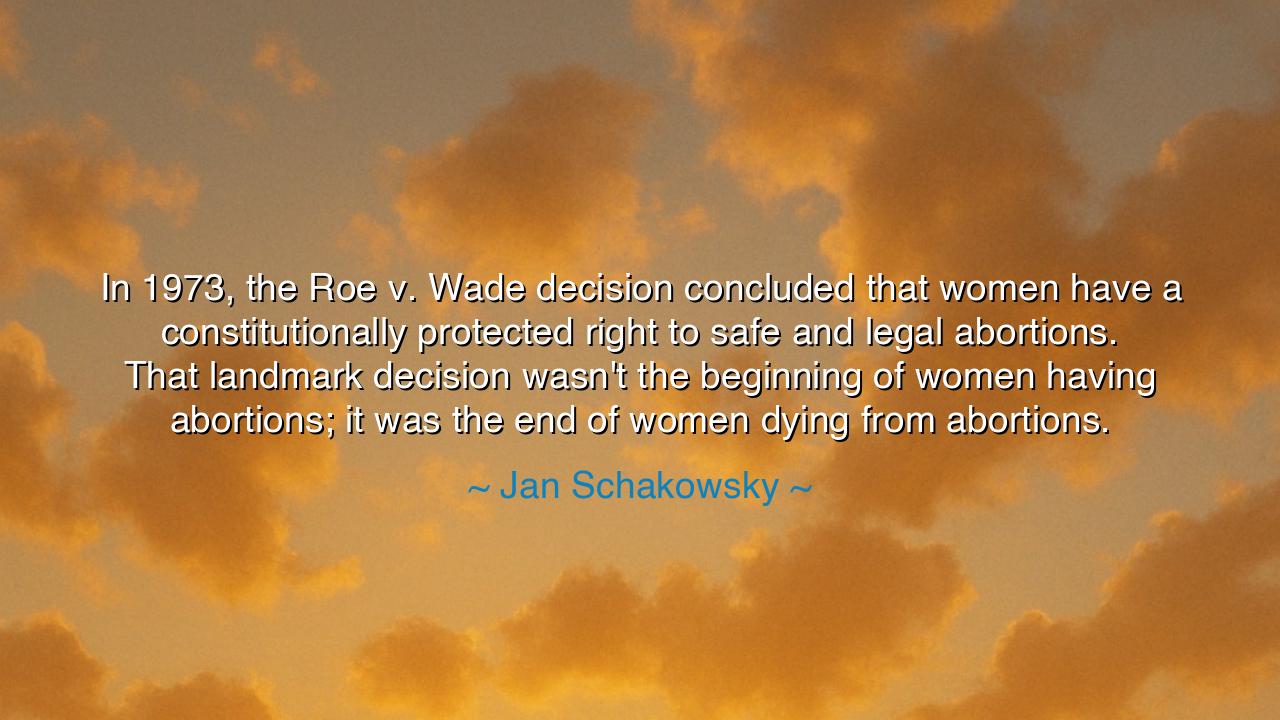
In 1973, the Roe v. Wade decision concluded that women have a
In 1973, the Roe v. Wade decision concluded that women have a constitutionally protected right to safe and legal abortions. That landmark decision wasn't the beginning of women having abortions; it was the end of women dying from abortions.






Hear the solemn words of Jan Schakowsky: “In 1973, the Roe v. Wade decision concluded that women have a constitutionally protected right to safe and legal abortions. That landmark decision wasn’t the beginning of women having abortions; it was the end of women dying from abortions.” These words do not speak of abstract law alone, but of life and death, of suffering turned into safety, of shadows being lifted from the lives of countless women. They remind us that the power of law is not only to regulate, but to protect, to save, and to recognize dignity where once it was denied.
The meaning of this quote lies in its piercing clarity: abortion did not begin with Roe v. Wade. For centuries, women sought to end pregnancies, whether through dangerous herbs, clandestine procedures, or desperate acts of their own. Before 1973, countless women died from unsafe and unregulated practices. The decision of Roe did not create the reality of abortion; it created the possibility of survival. It gave women the right not only to choose, but to live through that choice.
History bears grim witness to this truth. In the decades before Roe, hospitals had entire wards known as “septic abortion wards,” filled with women suffering from infections, hemorrhage, and trauma caused by unsafe procedures. Physicians spoke of seeing young women—mothers, daughters, sisters—arrive at their doors too late to be saved. Their deaths were not inevitable, but the result of secrecy, stigma, and laws that forced them into the shadows. Schakowsky’s words remind us that Roe was not about beginning something new, but about ending an epidemic of needless death.
Consider the parallel of Prohibition in America. When alcohol was outlawed, it did not vanish; it was driven underground, where crime and corruption flourished, and countless people drank unsafe, tainted liquor. Only when regulation returned did the death toll lessen. So too with abortion: to ban it does not erase it, but only makes it deadly. Roe v. Wade brought what was once hidden into the light of medicine, placing it in the care of trained hands rather than leaving it to back alleys and desperation.
The heart of Schakowsky’s words also speaks to the deeper principle of constitutional protection. The Constitution, as interpreted in Roe, recognized that the right to privacy, the right to bodily autonomy, and the right to health extended to women in this most personal of decisions. It was not granting permission for the first time, but acknowledging a right that had always existed, though often denied by society and law. Thus Roe was not only a medical milestone, but a moral one, declaring that women’s lives and choices mattered under the highest law of the land.
The lesson for us is profound: when society turns away from reality, people suffer. When law denies truth, injustice flourishes. Roe v. Wade was a recognition that pretending abortion did not exist cost women their lives. By facing reality with compassion and reason, society saved lives and affirmed dignity. The same lesson applies to every great challenge: denial breeds death, while acknowledgment opens the path to healing.
Practical action flows from this wisdom. Guard the principles of justice that protect life and dignity, even when they are contested. Listen to the lived experiences of those most affected, for policy is not theory but blood and breath. Defend access to safe medical care, remembering that rights delayed or denied become tragedies in waiting. Above all, teach others the truth Schakowsky proclaimed: Roe was not the beginning of abortion, but the end of women dying in silence.
Thus let her words echo across generations: Roe v. Wade was more than a legal battle—it was the drawing of a line between life and death, between secrecy and safety, between denial and truth. And if we forget that lesson, history will repeat its sorrows. But if we remember, we may yet build a society where law protects, where compassion reigns, and where no one must die for lack of recognition of their humanity.






AAdministratorAdministrator
Welcome, honored guests. Please leave a comment, we will respond soon